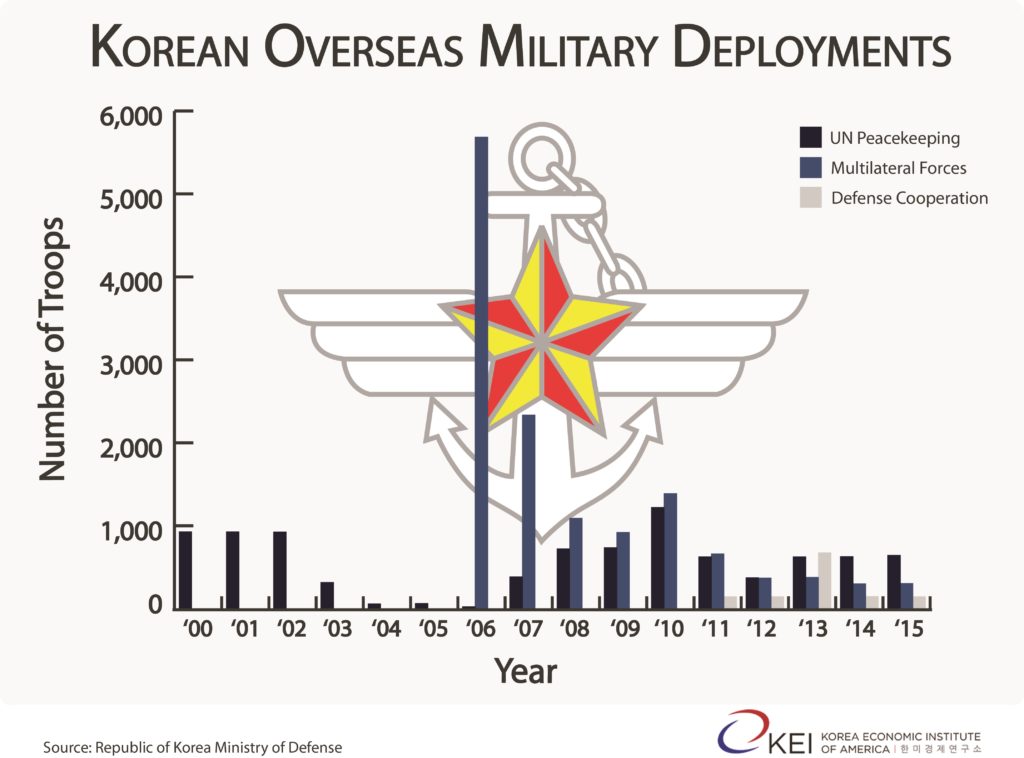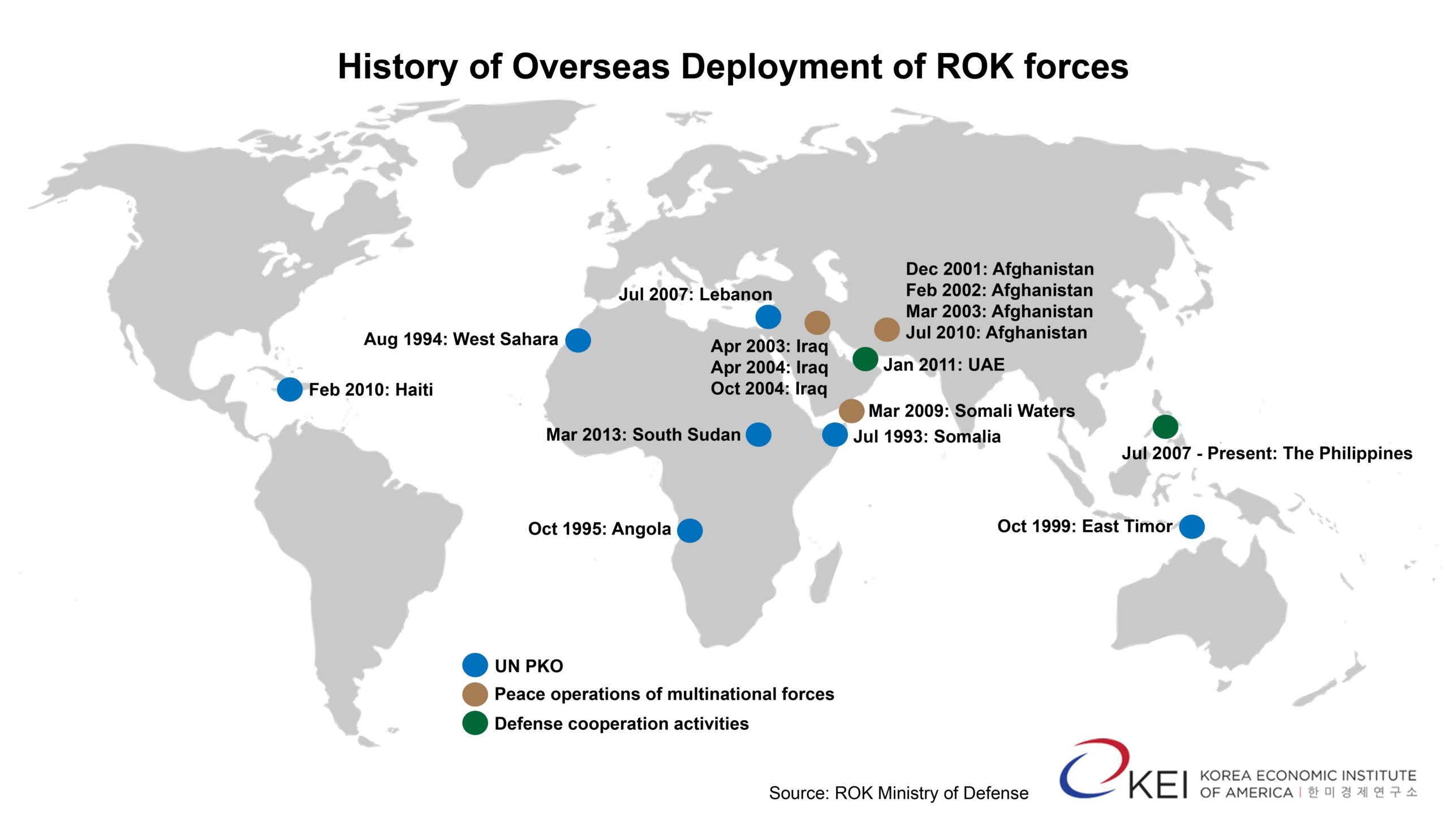The Peninsula
South Korea’s Overseas Peacekeeping Activities – Part I: The History and Current Status
Published July 29, 2016
Category: South Korea

By Hojun Song
On May 27, 2016, during her official state visit to Ethiopia, President Park Geun-hye visited soldiers from the Hanbit unit, which consists of South Korean troops deployed as part of the United Nations peacekeeping mission in South Sudan. She praised their hard work and encouraged them to keep upmost efforts in assisting South Sudan’s reconstruction. President Park Geun-hey also visited another South Korean dispatch, the Cheonghae unit, in the port of Abu Dhabi last year. As she already pledged to make additional deployments of South Korean troops to overseas peacekeeping activities in her speech delivered at the 70th Session of the General Assembly of the United Nations, it is expected that South Korea’s contribution to overseas peacekeeping missions will play a more critical role in contributing to international peace and security.
The Republic of Korea Armed Forces were established for defending the sovereignty and territorial integrity of South Korea, mainly from military threats from North Korea. However, as South Korea became the world’s eleventh largest economy and the economic gap between the two Koreas widened drastically, the ROK Armed Forces started to increase its engagement in international affairs such as humanitarian and disaster-relief efforts worldwide. It reflects both South Korea’s eagerness to repay the aid and assistance from the international community which had allowed South Korea to overcome the wounds of Korean War and its efforts to play a proactive role in the international community. As of June 2016, the ROK Armed Forces had 1,108 soldiers supporting peacekeeping operations in 13 countries.
The ROK Armed Forces have participated in peacekeeping activities in various forms including multinational forces, the United Nations Peacekeeping Operation (PKO), and military cooperative activities. South Korea’s first participation in a multilateral force was the Vietnam War, which was also the first overseas deployment of the ROK Armed Forces. As part of multilateral force, South Korea deployed 325,517 soldiers to South Vietnam from 1964 to 1973. South Korea also deployed its armed forces as part of a multilateral force to the Persian Gulf War, Afghanistan, and the second Iraq War. Mostly, South Korea deployed medial support, transport, and engineering units for assisting multilateral forces. The Zaytun Division which carried out peacekeeping and reconstruction missions in Iraqi Kurdistan from 2004 to 2008 was the biggest overseas deployment after the Vietnam War and praised for its contribution to the stabilization and economic development in Irbil.
One on-going peacekeeping activity in which South Korea participates is the counter-piracy operations of the Operation Enduring Freedom (OEF) in the waters of Somalia. Since its deployment in 2008, the Cheonghae unit has tracked down 31 pirate ships and escorted 2,048 South Korean cargo ships through the Gulf of Aden, through which about 30 percent of South Korean commerce ships pass. In 2011, the Cheonghae unit safely rescued all 21 hostages of the South Korean chemical tanker Samho Jewelry which was seized by Somali pirates in the Gulf of Aden. This rescue operation was praised by Richard Spencer, the then British chief of the European Union’s naval forces, as a remarkable case considering that similar operations used to show hostage casualty rates of about 10 percent.
The history of South Korea’s participation in PKOs dates back to 1991 when South Korea became an official member of the United Nations. After two years, in July 1993, South Korea deployed the Evergreen engineering unit of 250 soldiers to Somalia as its first PKO mission to support the United Nations Operation in Somalia II (UNOSOM II). The Evergreen unit conducted reconstruction missions such as road repair and irrigation canal construction for 8 months. In 1994, ROK Armed Forced Medical Support Group was deployed to support the United Nations Mission for the Referendum in Western Sahara (MINURSO) and provided medial support for 12 years. In 1995, the Evergreen engineering unit was deployed to Angola for supporting the United Nations Angola Verification Mission III (UNAVEM III) for 14 months. In 1999, the Evergreen unit was reorganized into a combat unit of 419 soldiers and deployed to preserve the security of newly independent East Timor under the United Nations Mission in East Timor (UNMET) for four years.
There was a significant decrease in the number of troops deployed to PKO missions from 2003 to 2006 as South Korea participated in reconstruction missions in Afghanistan and Iraq, and South Korea decided to deploy the Dongmyeong unit to Tyre, Lebanon for assisting peacekeeping operations of the United Nations Interim Force in Lebanon (UNIFIL) in 2007. Since 2007, the Dongmyeong unit has conducted approximately 31,000 reconnaissance and surveillance operations without a single accident. Also, through the “Peace Wave” civil affairs operation, the Dongmyeong unit provided local people 81,816 medical treatments, and conducted 215 community support programs including building schools and gymnasiums. As of 2016, the Dongmyeong unit is currently the longest PKO deployment of South Korea.
South Korea’s PKO missions were also deployed for humanitarian relief. In 2010, the Danbi unit was deployed to Léogâne, Haiti in the aftermath of the 2010 Haiti earthquake. The Danbi unit supported the reconstruction missions of the United Nations Stabilization Mission in Haiti (UNSTAMIH) by removing debris, repairing roads, and providing medical aid, and completed its operation in December 2012. The Hanbit unit, the seventh and most recent PKO mission, was dispatched to Bor, South Sudan in 2013. The Hanbit unit constructed the 125km-long highway from Bor to Juba, the capital city of South Sudan, and built a 17km-long bank along the White Nile. The new road increased the volume of traffic to Juba 20 times and the new bank prevented flooding of the river the first time. In December 2012, when conflicts between the government and rebel forces in Bor region caused a number of refugees, the Hanbit unit enlarged the protection of civilians site in the United States Mission in South Sudan (UNMISS) camp, and provided protection, food, and medical treatment to 17,000 refugees. The then UNIMISS force commander Delali Johnson Sakyi, a Ghana’s Maj. Gen., acclaimed the Hanbit unit’s operation as one of the most successful refugee protections in the history of United Nations peacekeeping operation. In December 2015, the Hanbit unit established an agricultural training center in Bor and still keeps its civil affair operations for boosting economic activities and improving food security in South Sudan.
Lastly, there are military cooperative activities initiated by a request of partner governments. From 2013 to 2014, South Korea deployed the ROK Joint Support Group for the Philippines, the Araw unit, in Tacloban, the Philippines to assist in the recovery from damage by Super Typhoon Yolanda (Haiyan). Also, in 2011, the Akh unit of 130 special warfare troops was stationed in the United Arab Emirates (UAE) to helping train the UAE special forces. The Akh unit is still in the UAE strengthening military cooperation between South Korea and the UAE.
Given remarks by President Park Geun-hye at the Leaders’ Summit on Peacekeeping in September 2015, South Korea’s support to overseas peacekeeping activities is likely to increase. As she promised, South Korea will provide deployable level-two hospital equipment for enhancing the peacekeeping capacity of the African Union and scale up South Korea’s financial contributions for the United Nations’ work on conflict prevention and peacebuilding. It will be interesting to see how South Korea’s overseas peacekeeping activities will contribute to share the world peace and prosperity.
Hojun Song is an intern with the Korea Economic Institute and a graduate student at the Fletcher School of Law and Diplomacy at Tufts University.
Photo from United Nations Photo photostream on flickr Creative Commons.


